FORWARD TO THE PAST
Southern Baptists expel Virginia church for believing women can serve as pastors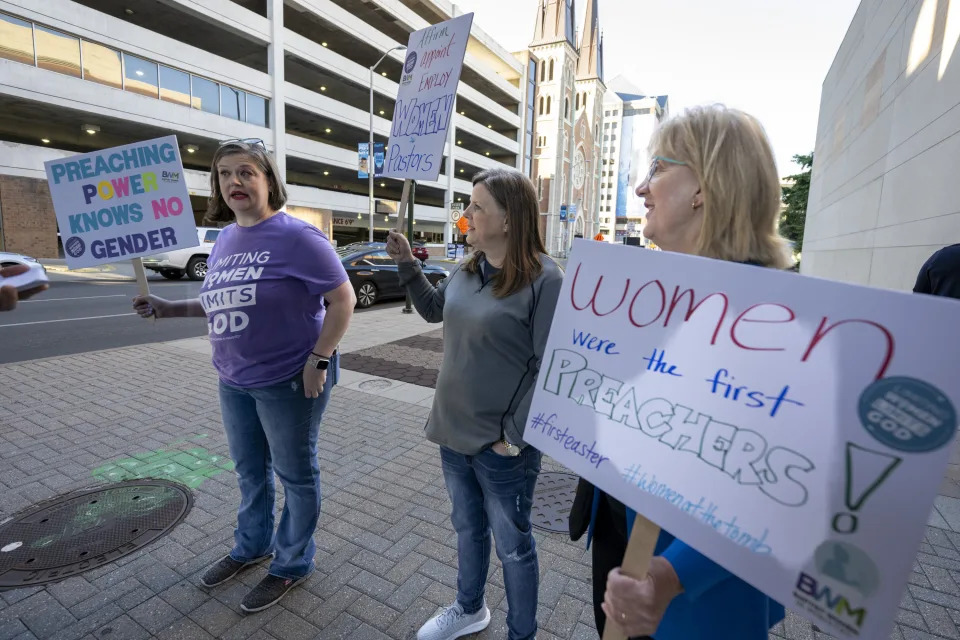
PETER SMITH
Updated Tue, June 11, 2024
INDIANAPOLIS (AP) — Even as they prepare to vote on a formal ban on churches with women pastors, delegates to the Southern Baptist Convention annual meeting voted overwhelmingly Tuesday to boot one such church from its ranks.
Messengers, as voting representatives are known, voted 6,759 to 563 to oust First Baptist Church of Alexandria, a historic Virginia congregation that affirms women can serve in any pastoral role, including as senior pastor. A similar scenario played out at last year’s meeting. Two congregations, including a well-known California megachurch, were ejected from the convention. Ninety-two percent of messengers approved this year's ouster.
The Virginia congregation has been involved in the nation's largest Protestant denomination since its 19th century founding and has contributed millions toward denominational causes. But it came under scrutiny after the pastor of a neighboring church reported it to denominational authorities over its having a woman as pastor for children and women.
The vote came after the denomination's credentials committee recommended earlier Tuesday that the denomination deem the church to be not in “friendly cooperation,” the formulation for expulsion, on the grounds that it conflicts with the Baptist Faith and Message. That statement of Southern Baptist doctrine declares only men are qualified for the role of pastor. Some interpret that only to apply to associate pastors as long as the senior pastor is male.
“We find no joy in making this recommendation, but have formed the opinion that the church’s egalitarian beliefs regarding the office of pastor do not closely identify with the convention’s adopted statement of faith,” said Jonathan Sams, chair of the credentials committee.
The Alexandria church is currently led by a man, Robert Stephens, but the church has made clear it believes women can serve as senior pastors, too. Stephens said his church has had women in ministry for more than 44 years and wants to continue cooperating with Southern Baptists who disagreed on this issue.
“First Alexandria stands before you today as a testament that we can maintain a fruitful partnership with churches that take a different stance on women in ministry,” he said. “We at First Baptist are advancing the gospel, and we hope that we will continue to work alongside you all.”
Afterward, representatives from the Alexandria church said they wished the SBC well. But they said they would focus on First Baptist's own work, ranging from sending a mission team to Nicaragua to partnering on a Bible translation project to taking part in a church youth camp and other ministries.
“This is a sad moment for us, but we also recognize that God has a future for First Baptist Church,” Stephens said.
“We have good news to share with the world, and we will keep doing that,” added Kim Eskridge, the pastor for children and women.
On Wednesday, delegates are slated to consider enshrining a ban on churches with any women pastors in the SBC's constitution. The proposed amendment received preliminary approval last year, and it requires a final vote this year to be enacted. As of Tuesday evening, 10,895 messengers were registered to take part.
Early Tuesday, a small group of women stood outside the Indiana Convention Center in a low-key demonstration in support of women in ministry.
“I hope that people know women have equal value and can be pastors,” said the Rev. Meredith Stone, executive director of Baptist Women in Ministry. The organization originated among Southern Baptists in the 1980s, but it now works with women in a variety of Baptist denominations.
Joining them was Christa Brown, who has long advocated for fellow survivors of sexual abuse in Southern Baptist churches and criticized the denomination’s resistance to reforms, an effort she has chronicled in a new memoir, “Baptistland.” The Southern Baptists ongoing struggles with sexual abuse reforms is also on this year's calendar.
She said there’s a direct connection between issues of abuse and the equality of women in ministry.
“When you squash some people, it sets up a lot more people to be squashed,” she said.
An SBC Abuse Reform Implementation Task Force recently concluded its work. While it has provided a curriculum for training churches on preventing and responding to abuse, it has not achieved the mandate of previous annual meetings to establish a “Ministry Check” database of offenders, which could help churches avoid hiring them.
“We’re probably beyond frustrated that there are not names on the database right now or the database is not live right now,” said Josh Wester, chairman of the task force, which officially concluded its work Tuesday. Messengers adopted its recommendations and assigned the denomination’s Executive Committee to complete goals such as activating Ministry Check and creating a “permanent home” for abuse response.
After denominational officials said they couldn’t get insurance for producing a Ministry Watch list, Wester said he and some others set up a separate non-profit organization to maintain it. But he said the Executive Committee’s new leadership is looking for ways to oversee it in-house.
The list would include those convicted or found liable for abuse in civil court — short of an earlier annual meeting’s call for a list including those who confessed or were credibly accused outside of court.
Wester said the ultimate goal is for a broader list.
“We’re just trying to get a database online because it can always be improved,” Wester said.
Though some have advocated for reforms for the past two decades, the SBC has particularly struggled to respond to sexual abuse in its churches since a 2019 report by the Houston Chronicle and San Antonio Express-News. It said that roughly 380 Southern Baptist church leaders and volunteers faced allegations of sexual misconduct in the previous two decades.
The denomination subsequently commissioned a report from a consulting firm, Guidepost Solutions. It concluded that leaders of the convention’s Executive Committee intimidated and mistreated survivors who sought help. The committee handles day-to-day business of the convention.
Some outspoken voices have contended that there is no crisis of abuse in the convention and that such claims are overstated.
But survivor Tiffany Thigpen, one of several advocates for abuse survivors attending the meeting, noted that SBC messengers have repeatedly supported reforms.
“Our hope has been that the messengers finally get as frustrated as we’ve been and say, ‘OK, wait, we’re not allowing this anymore,’" she said.
In events held on the sidelines of the meeting, politics has been featured. On Monday, former President Donald Trump appealed for votes in a videotaped message to attendees of a staunchly anti-abortion conservative group that met next door to the convention center.
On Tuesday, former Vice President Mike Pence told an audience of about 500 that he would “never” vote for President Joe Biden, criticizing him on border, abortion and other policies. But Pence stopped short of endorsing Trump, his estranged onetime running mate.
Later, messengers approved a resolution against any effort to establish a state religion, including “Christianity as the state religion of the United States” — a notable move given the rise of Christian nationalism in some conservative circles. The resolution calls for robust religious freedoms and for Christians to get involved in public office.
___
Associated Press religion coverage receives support through the AP’s collaboration with The Conversation US, with funding from Lilly Endowment Inc. The AP is solely responsible for this content.
Southern Baptists are poised to ban churches with women pastors. Some are urging them to reconsider
Updated Tue, June 11, 2024
INDIANAPOLIS (AP) — Even as they prepare to vote on a formal ban on churches with women pastors, delegates to the Southern Baptist Convention annual meeting voted overwhelmingly Tuesday to boot one such church from its ranks.
Messengers, as voting representatives are known, voted 6,759 to 563 to oust First Baptist Church of Alexandria, a historic Virginia congregation that affirms women can serve in any pastoral role, including as senior pastor. A similar scenario played out at last year’s meeting. Two congregations, including a well-known California megachurch, were ejected from the convention. Ninety-two percent of messengers approved this year's ouster.
The Virginia congregation has been involved in the nation's largest Protestant denomination since its 19th century founding and has contributed millions toward denominational causes. But it came under scrutiny after the pastor of a neighboring church reported it to denominational authorities over its having a woman as pastor for children and women.
The vote came after the denomination's credentials committee recommended earlier Tuesday that the denomination deem the church to be not in “friendly cooperation,” the formulation for expulsion, on the grounds that it conflicts with the Baptist Faith and Message. That statement of Southern Baptist doctrine declares only men are qualified for the role of pastor. Some interpret that only to apply to associate pastors as long as the senior pastor is male.
“We find no joy in making this recommendation, but have formed the opinion that the church’s egalitarian beliefs regarding the office of pastor do not closely identify with the convention’s adopted statement of faith,” said Jonathan Sams, chair of the credentials committee.
The Alexandria church is currently led by a man, Robert Stephens, but the church has made clear it believes women can serve as senior pastors, too. Stephens said his church has had women in ministry for more than 44 years and wants to continue cooperating with Southern Baptists who disagreed on this issue.
“First Alexandria stands before you today as a testament that we can maintain a fruitful partnership with churches that take a different stance on women in ministry,” he said. “We at First Baptist are advancing the gospel, and we hope that we will continue to work alongside you all.”
Afterward, representatives from the Alexandria church said they wished the SBC well. But they said they would focus on First Baptist's own work, ranging from sending a mission team to Nicaragua to partnering on a Bible translation project to taking part in a church youth camp and other ministries.
“This is a sad moment for us, but we also recognize that God has a future for First Baptist Church,” Stephens said.
“We have good news to share with the world, and we will keep doing that,” added Kim Eskridge, the pastor for children and women.
On Wednesday, delegates are slated to consider enshrining a ban on churches with any women pastors in the SBC's constitution. The proposed amendment received preliminary approval last year, and it requires a final vote this year to be enacted. As of Tuesday evening, 10,895 messengers were registered to take part.
Early Tuesday, a small group of women stood outside the Indiana Convention Center in a low-key demonstration in support of women in ministry.
“I hope that people know women have equal value and can be pastors,” said the Rev. Meredith Stone, executive director of Baptist Women in Ministry. The organization originated among Southern Baptists in the 1980s, but it now works with women in a variety of Baptist denominations.
Joining them was Christa Brown, who has long advocated for fellow survivors of sexual abuse in Southern Baptist churches and criticized the denomination’s resistance to reforms, an effort she has chronicled in a new memoir, “Baptistland.” The Southern Baptists ongoing struggles with sexual abuse reforms is also on this year's calendar.
She said there’s a direct connection between issues of abuse and the equality of women in ministry.
“When you squash some people, it sets up a lot more people to be squashed,” she said.
An SBC Abuse Reform Implementation Task Force recently concluded its work. While it has provided a curriculum for training churches on preventing and responding to abuse, it has not achieved the mandate of previous annual meetings to establish a “Ministry Check” database of offenders, which could help churches avoid hiring them.
“We’re probably beyond frustrated that there are not names on the database right now or the database is not live right now,” said Josh Wester, chairman of the task force, which officially concluded its work Tuesday. Messengers adopted its recommendations and assigned the denomination’s Executive Committee to complete goals such as activating Ministry Check and creating a “permanent home” for abuse response.
After denominational officials said they couldn’t get insurance for producing a Ministry Watch list, Wester said he and some others set up a separate non-profit organization to maintain it. But he said the Executive Committee’s new leadership is looking for ways to oversee it in-house.
The list would include those convicted or found liable for abuse in civil court — short of an earlier annual meeting’s call for a list including those who confessed or were credibly accused outside of court.
Wester said the ultimate goal is for a broader list.
“We’re just trying to get a database online because it can always be improved,” Wester said.
Though some have advocated for reforms for the past two decades, the SBC has particularly struggled to respond to sexual abuse in its churches since a 2019 report by the Houston Chronicle and San Antonio Express-News. It said that roughly 380 Southern Baptist church leaders and volunteers faced allegations of sexual misconduct in the previous two decades.
The denomination subsequently commissioned a report from a consulting firm, Guidepost Solutions. It concluded that leaders of the convention’s Executive Committee intimidated and mistreated survivors who sought help. The committee handles day-to-day business of the convention.
Some outspoken voices have contended that there is no crisis of abuse in the convention and that such claims are overstated.
But survivor Tiffany Thigpen, one of several advocates for abuse survivors attending the meeting, noted that SBC messengers have repeatedly supported reforms.
“Our hope has been that the messengers finally get as frustrated as we’ve been and say, ‘OK, wait, we’re not allowing this anymore,’" she said.
In events held on the sidelines of the meeting, politics has been featured. On Monday, former President Donald Trump appealed for votes in a videotaped message to attendees of a staunchly anti-abortion conservative group that met next door to the convention center.
On Tuesday, former Vice President Mike Pence told an audience of about 500 that he would “never” vote for President Joe Biden, criticizing him on border, abortion and other policies. But Pence stopped short of endorsing Trump, his estranged onetime running mate.
Later, messengers approved a resolution against any effort to establish a state religion, including “Christianity as the state religion of the United States” — a notable move given the rise of Christian nationalism in some conservative circles. The resolution calls for robust religious freedoms and for Christians to get involved in public office.
___
Associated Press religion coverage receives support through the AP’s collaboration with The Conversation US, with funding from Lilly Endowment Inc. The AP is solely responsible for this content.
Southern Baptists are poised to ban churches with women pastors. Some are urging them to reconsider
Peter Smith, Associated Press
Tue, June 11, 2024

(AP) – From its towering white steeple and red-brick facade to its Sunday services filled with rousing gospel hymns and evangelistic sermons, First Baptist Church of Alexandria, Virginia, bears many of the classic hallmarks of a Southern Baptist church.
On a recent Sunday, its pastor for women and children, Kim Eskridge, urged members to invite friends and neighbors to an upcoming vacation Bible school — a perennial Baptist activity — to help “reach families in the community with the gospel.”
But because that pastor is a woman, First Baptist’s days in the Southern Baptist Convention may be numbered.
At the SBC’s annual meeting June 11-12 in Indianapolis, representatives will vote on whether to amend the denomination’s constitution to essentially ban churches with any women pastors — and not just in the top job. That measure received overwhelming approval in a preliminary vote last year.
Leaders of First Baptist – which has given millions to Southern Baptist causes and has been involved with the convention since its 19th century founding — are bracing for a possible expulsion.
“We are grieved at the direction the SBC has taken,” the church said in a statement.
And it’s not alone.
By some estimates, the proposed ban could affect hundreds of congregations and have a disproportionate impact on predominantly Black churches.
The vote is partly the culmination of events set in motion two years ago.
That’s when a Virginia pastor contacted SBC officials to contend that First Baptist and four nearby churches were “out of step” with denominational doctrine that says only men can be pastors. The SBC Credentials Committee launched a formal inquiry in April.
Southern Baptists disagree on which ministry jobs this doctrine refers to. Some say it’s just the senior pastor, others that a pastor is anyone who preaches and exercises spiritual authority.
And in a Baptist tradition that prizes local church autonomy, critics say the convention shouldn’t enshrine a constitutional rule based on one interpretation of its non-binding doctrinal statement.
By some estimates, women are working in pastoral roles in hundreds of SBC-linked churches, a fraction of the nearly 47,000 across the denomination.
But critics say the amendment would amount to a further narrowing in numbers and mindset for the nation’s largest Protestant denomination, which has moved steadily rightward in recent decades.
They also wonder if the SBC has better things to do.
It has struggled to respond to sexual abuse cases in its churches. A former professor at a Southern Baptist seminary in Texas was indicted in May on a charge of falsifying a record about alleged sexual abuse by a student in order to obstruct a federal investigation into sexual misconduct in the convention.
SBC membership has dipped below 13 million, nearly a half-century low. Baptismal rates are in long-term decline.
The amendment, if passed, wouldn’t prompt an immediate purge. But it could keep the denomination’s leaders busy for years, investigating and ousting churches.
From women pastors to sexual abuse to Trump, Southern Baptists have a busy few days ahead of them
Many predominantly Black churches have men as lead pastors but assign pastor titles to women in other areas, such as worship and children’s ministries.
“To disfellowship like-minded churches … based on a local-church governance decision dishonors the spirit of cooperation and the guiding tenets of our denomination,” wrote Pastor Gregory Perkins, president of the SBC’s National African American Fellowship, to denominational officials.
The controversy complicates the already-choppy efforts by the mostly white denomination to diversify and overcome its legacy of slavery and segregation.
Amendment proponents say the convention needs to reinforce its doctrinal statement, the Baptist Faith and Message, which says the office of pastor is “limited to men as qualified by Scripture.”
“If we won’t stand on this issue and be unapologetically biblical, then we won’t stand on anything,” said amendment proponent Mike Law, pastor of Arlington Baptist Church in Virginia.
Since Baptist churches are independent, the convention can’t tell them what to do or whom to appoint as a pastor.
But the convention can decide which churches are in and which are out. And even without a formal amendment, its Executive Committee has begun telling churches with women pastors that they’re out. That included one of its largest, Saddleback Church of California.
When Saddleback and a small Kentucky church appealed to the annual meeting in 2023, delegates overwhelmingly refused to take them back.
The amendment would give such enforcement actions more teeth.
Some churches with women pastors quit on their own in the past year. They range from Elevation Church, a North Carolina megachurch, to First Baptist of Richmond, Virginia, which had close SBC ties from the convention’s founding.
Law contended the issue has been a “canary in the coalmine” for liberal denominations, several of which began ordaining women and later LGBTQ+ people.
“Southern Baptists are facing a decisive moment,” he said in a video on a pro-amendment website. “Here’s the trajectory of doing nothing: Soon Southern Baptist churches will start openly supporting homosexual clergy, same-sex marriage and eventually transgenderism.”
Others point out that Pentecostal and other denominations have had women pastors for generations and remain theologically conservative.
Some SBC churches with women pastors are heavily involved with the convention, while others have minimal connections and identify more closely with historically Black or other progressive denominations.
Also, some SBC churches interpret the 2000 faith statement as only applying to senior pastors. As long as a the church leader is male, women can serve other pastoral roles, they say.
Such churches may leave if SBC leaders interfere with congregations following “their conscience, biblical convictions, and values by recognizing women can receive a pastoral gift from God in partnership with male leadership,” said Dwight McKissic, a pastor from Arlington, Texas, on the social media platform X.
Other churches say women can be in any role, including senior pastor, and churches can agree to disagree if they embrace most of the SBC faith statement.
That category includes First Baptist of Alexandria. Though its current senior pastor is male, it recognizes “God’s calling to ordain any qualified individual, male or female, for pastoral ministry,” the church said in a statement.
First Baptist leaders declined interview requests, but it has posted extensively about the issue on its website.
It said while it plans to send representatives to the SBC annual meeting, it was warned to expect a motion to deny them voting privileges.
“I do believe we need to be heard and represented,” Senior Pastor Robert Stephens told members in a video-recorded meeting.
The SBC’s top administrative body opposes the amendment. Investigating churches’ compliance would consume an unsustainable amount of time and energy over something that shouldn’t be a litmus test for fellowship, wrote Jeff Iorg, president of the SBC Executive Committee, in a Baptist Press commentary.
Baptist Women in Ministry, which began within the SBC in the 1980s but now works in multiple Baptist denominations, has taken note. The Rev. Meredith Stone, its executive director, said some women pastors within the SBC have reached out for support.
The group plans to release a documentary, “Midwives of a Movement,” about 20th century trailblazers for women in Baptist ministry, on the eve of the SBC meeting.
“As they are saying women have less value to God than men in the church, we want to make sure that women know they do have equal value and that there are no limits to how they follow Christ in the work of the church,” Stone said.
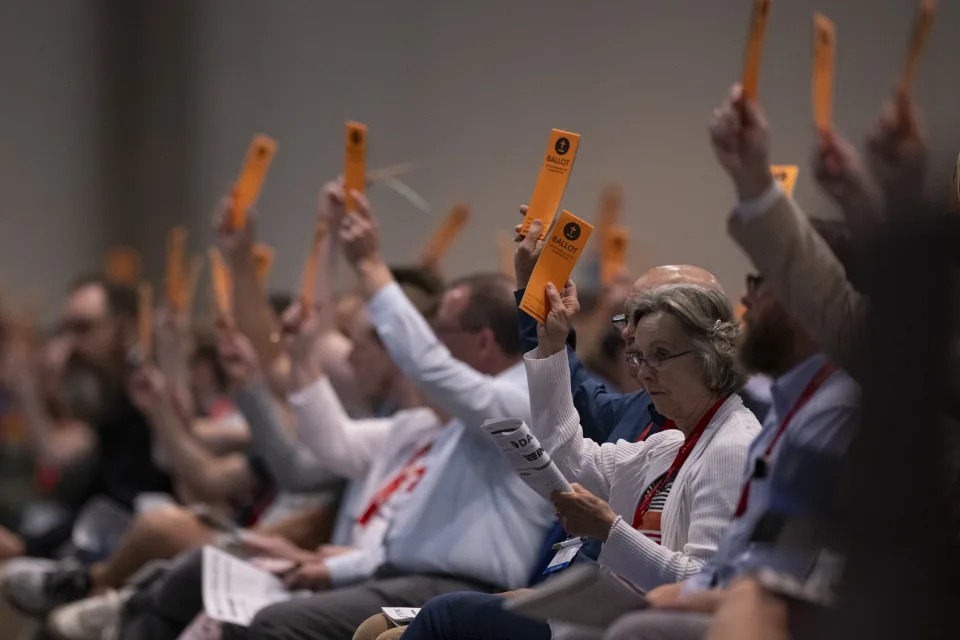
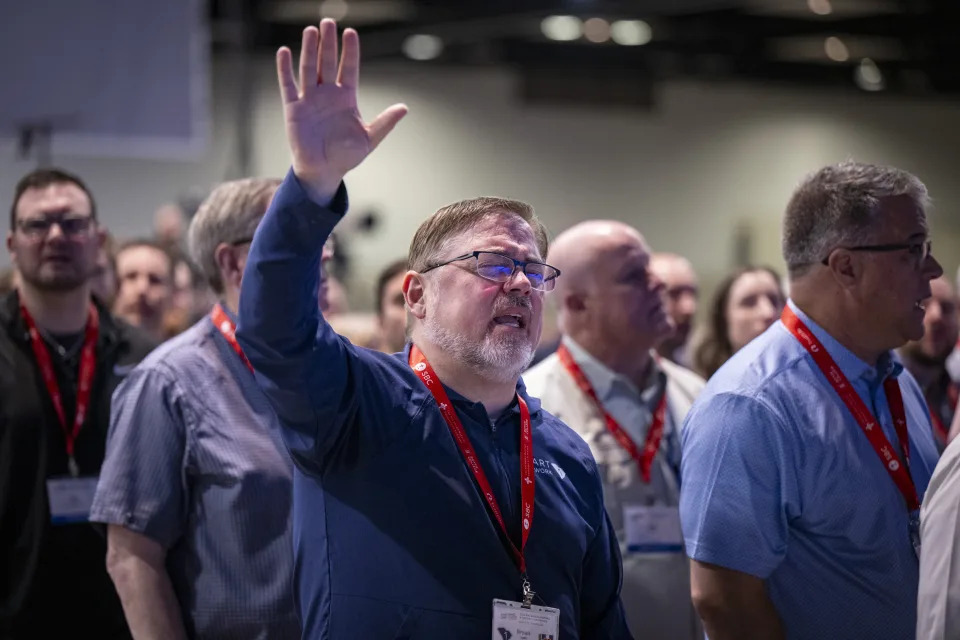
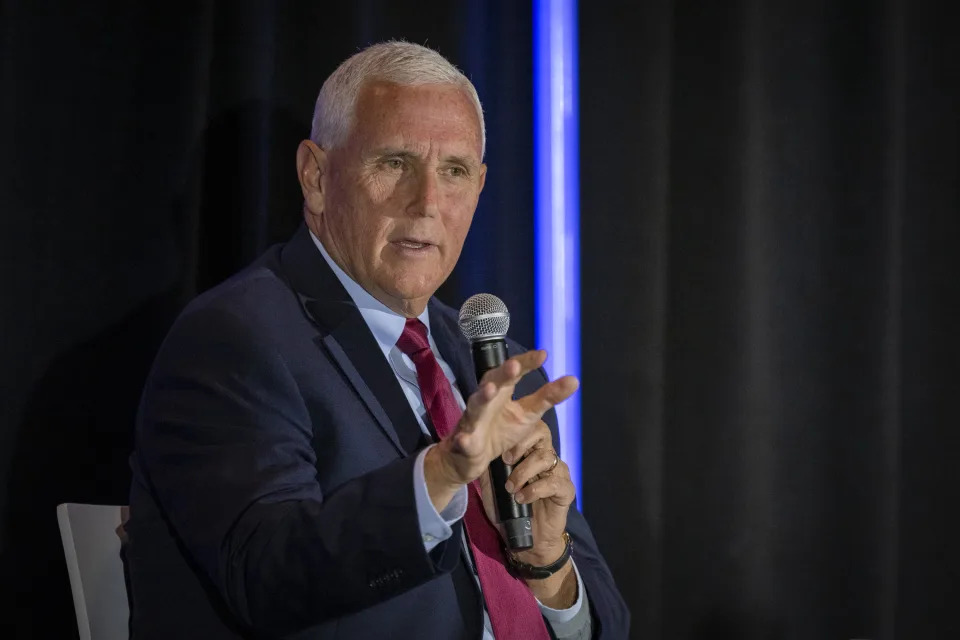
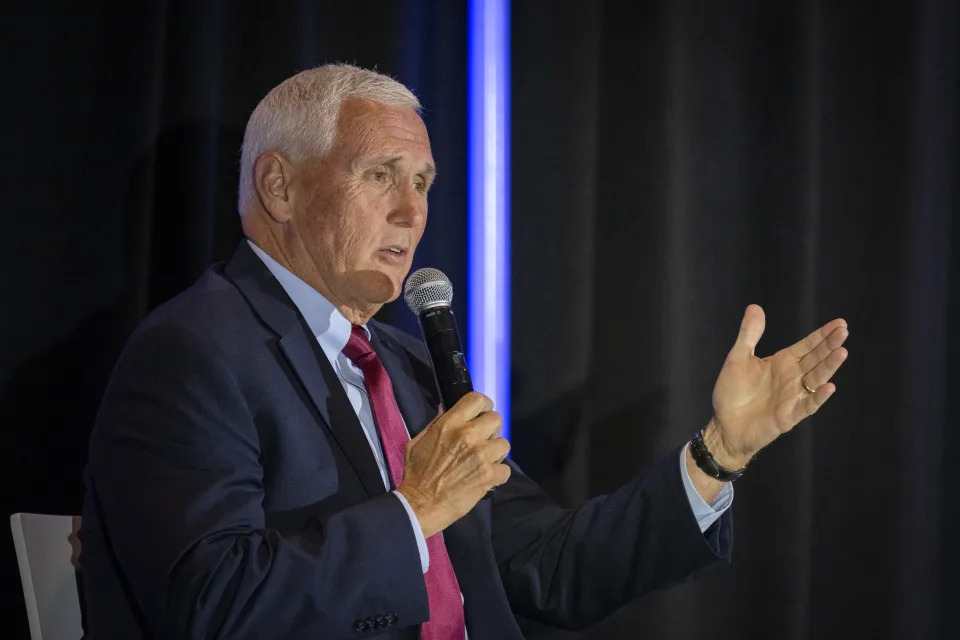
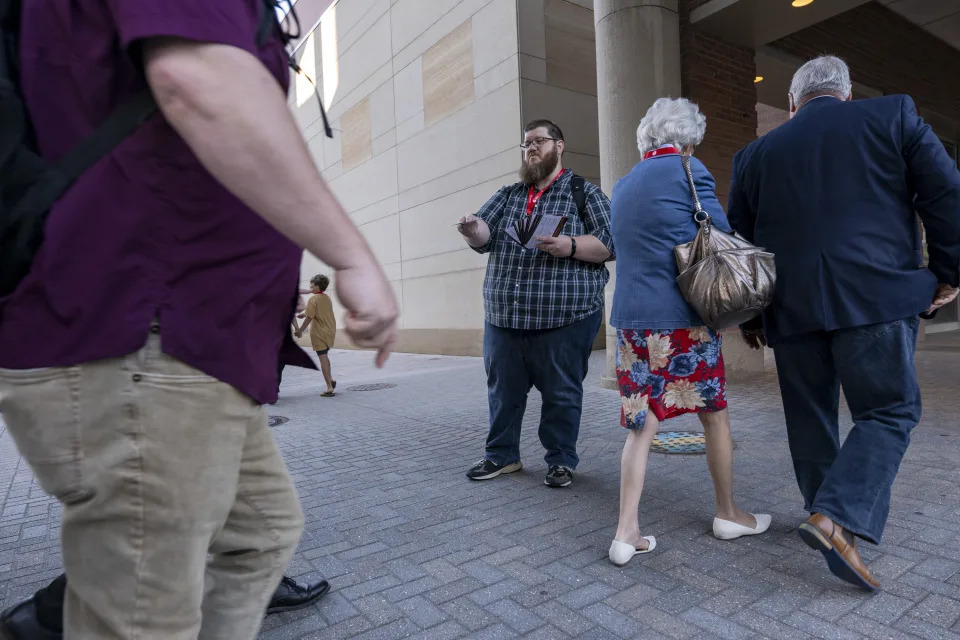
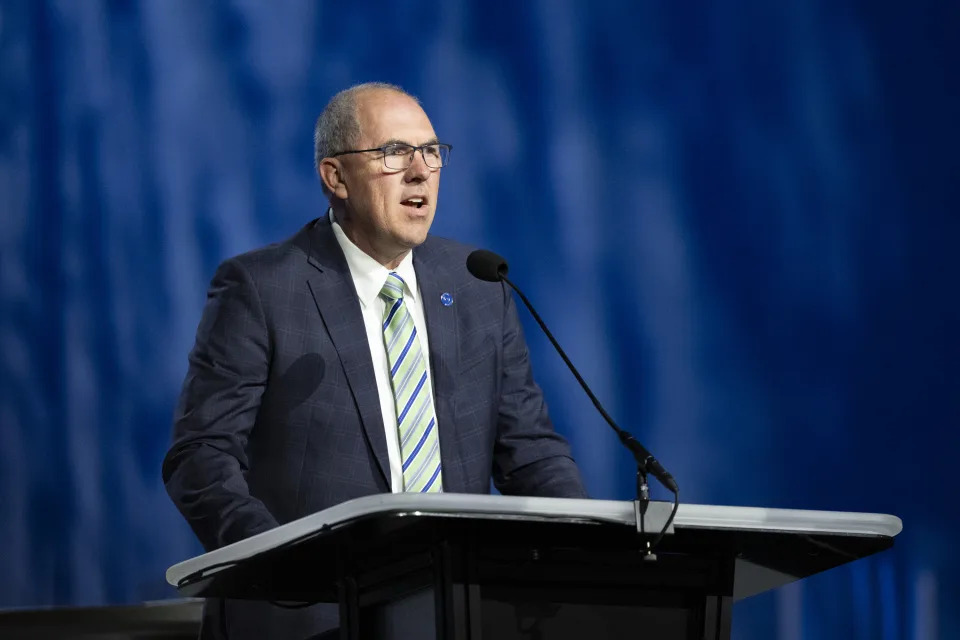

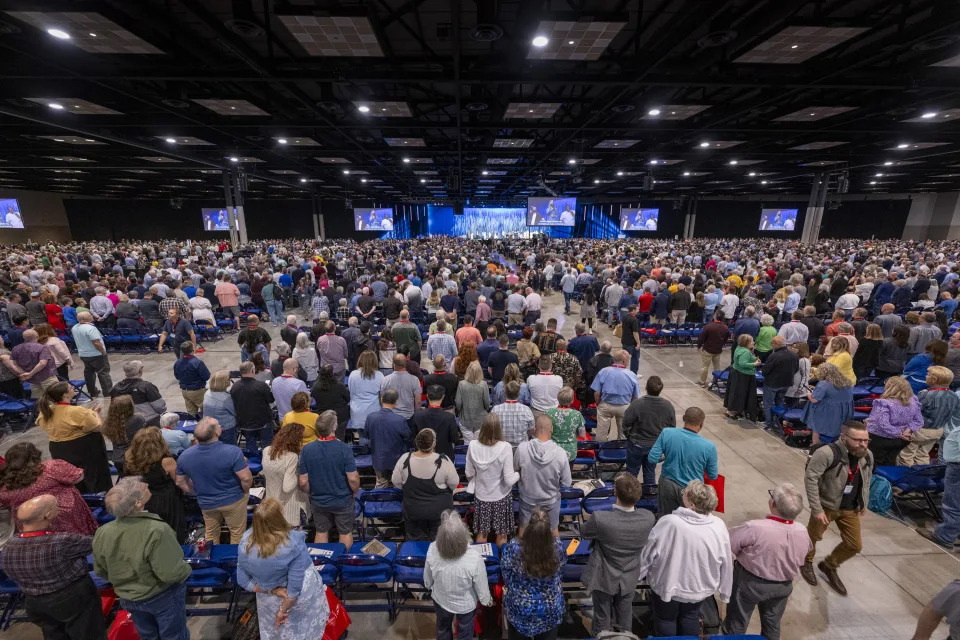
Southern Baptists
Messengers stand for worship during a Southern Baptist Convention annual meeting Tuesday, June 11, 2024, in Indianapolis. (AP Photo/Doug McSchooler)
ASSOCIATED PRESS
No comments:
Post a Comment